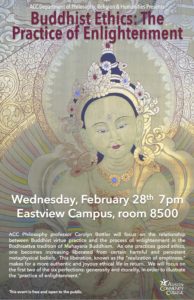 My guest today is Carolyn Bottler. Carolyn will be leading a discussion of Buddhist ethics later this month for the Austin Philosophy Forum.
My guest today is Carolyn Bottler. Carolyn will be leading a discussion of Buddhist ethics later this month for the Austin Philosophy Forum.
Carolyn is a long-time friend and colleague in the philosophy department. I asked Carolyn about her interest in Buddhism and Buddhist ethics.
My personal interest in Buddhist enlightenment and meditation grew out of my experience teaching Plato’s Socratic dialogues here at ACC. Socrates raises perplexing questions about the relationship between knowing and doing with his bold claims for the value of philosophy. Even though philosophy does not ever provide final answers, Socrates yet claimed that it was the greatest good, even worth dying for, just to have these discussions every day. My ACC students and I continue to investigate these questions at the beginning of each semester. How can it be the greatest blessing to find out that we don’t know what we thought we knew? Does increasing knowledge guarantee improvements in how we live? Can virtue be taught? How can a person know what the right action is, but not have the ability to do it? Buddhism is an ancient tradition with many similarities to the ancient Greek philosophers I so enjoy teaching at ACC, along with the advantage of still being practiced today. After ten years of working at meditation practice, and completing seven silent residential retreats, I am very excited for the opportunity to share some of my understanding of contemporary Buddhist theory and practice with the larger ACC community. This talk will be of interest to anyone who is concerned with virtue ethics, addiction and recovery, self-transformation, or meditation.
Thanks, Carolyn!
Join us for the Austin Philosophy Forum, hosted by ACC’s Department of Philosophy, Religion, and Humanities. Carolyn’s discussion of Buddhist ethics is free and open to the public, Wednesday, February 28, 7:00 PM, in room 8500 of the Eastview Campus.

Hi. When I was auditing the Ethics course, the thing I objected to most in the course is that Buddhism is called an atheistic religion. I corrected the instructor (and the book, if I remember). Buddhism is not atheistic. The Buddha simply never mentioned it, like homosexuality in the New Testament. The Buddha ignored it in his teachings. It would be correct to call Buddhism non-theistic. I understand the difference is cultural. Theism is a Western idea that never developed in east Asia. (But I may be in correct on that.)
Otherwise, the nun who is head of religious studies at the college I went to in San Antonio–Incarnate Word–sat zazen for years at the San Francisco zen Center while getting her PhD at Berkeley. When I was in Graduate school in Tucson I sat at a Thich Nhat Hanh meditation group that met once a week in a Benedictine monastery, with the support and encouragement of the Benedictines. I won’t go on, but in this authoritarian/populist Evangelical political climate words like “God” “atheism” “gun control” are fighting words, especially as mis-translated fro Sanskrit. David Collins, who used to run the CCP in Austin always reminded us that Buddhists are and have been committing genocide for years in Myanmar. Western religions have not cornered the market on war crime justification. But I’m distressed when I receive from an Ethics class, something I know not to be true and which conflates Asian and Western ideas of Ethics as though they were the same or arose from the same cultural traditions. I’m sure this won’t happen in the upcoming lecture on Buddhist Ethics.
For what it’s worth, I agree with your point concerning terminology. I am often mischaracterized as an “atheist,” but my position is better labeled as nontheistic, though for different reasons than Buddhism. But that’s the point, right? “A-theism” denies the existence of God, but Buddhism did not originally put the issues in that way. For me — speaking as a philosopher — I don’t think we can get far enough along conceptually to deny the existence of God, because that would require a consistent, coherent concept to begin with. I reject the idea that we can deny the existence of something by ellipsis or euphemism. 😉